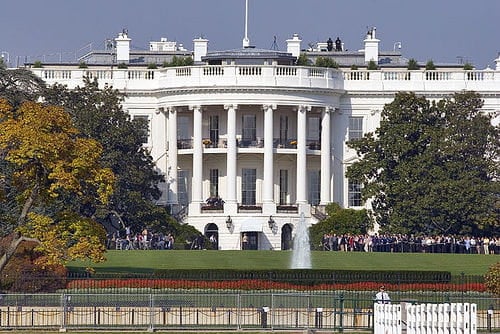To which the Greek patriarch replied by accusing the pope of sucking up too much to the Jews. Ah, Jerusalem.
Sunday, John Paul reached the apex of his history-making pilgrimage by celebrating Mass in the Church of the Holy Sepulchre--a church divided among competing denominations. The Mass was confined to a tiny side chapel used by the Franciscans. It's the only part of the large church Catholics have the right to use. Any other site would cause an unholy row.
The territorial squabbling is so intense and petty that a ladder sits rotting away on a ledge over the church's courtyard entrance. None of the factions here can agree on whose responsibility it is to remove the thing. It will sit there until the Almighty does the job via the elements.
As heartbreaking, infuriating, and altogether ridiculous this business is, I must confess that my own pilgrimage here with the pope has been one of the greatest blessings of my life.
Here, faith matters as much as it does anywhere else on earth. I'm coming home with my own faith deepened and renewed by what I've seen and done in the Holy Land, and by what I've heard the pope--"my" pope--say.
Sitting here in my hotel room, in sight of the walls of the Old City, it's hard to imagine going back to writing about American politics and the dreary presidential race we're having--"compassionate conservatism" and all that palaver. Jerusalem makes one think of eternal things. While here, I don't think I checked the Drudge Report once to see who was up and who was down in the White House race.
But having spent a week following this incredible man around the Holy Land, I've resolved to be more mindful of his teaching not only in my personal life but in my professional life as well. John Paul stayed in trouble this week for bringing politics into spiritual matters, but he never made an overtly political statement.
He only insisted that no man, be he Palestinian or Israeli, can legitimately keep the divine mandate to seek truth, do justice, make peace, and show respect for inalienable human rights separate from the way he lives. And that, unavoidably, includes politics.
Is John Paul the true compassionate conservative? I think so. His social conservatism, at least by American standards, is most evident in his unwavering defense of the rights of the unborn. To exterminate an unborn child in her mother's womb is an attack on the weakest of all human beings, he says, and it is carried out in the name of the wholly sovereign self.
However, John Paul has also thundered against the abuse of freedom in the prosperous Western democracies, in which a licentious and materialist people have, in his view, turned their back on God and the greater good to pursue pleasure and riches.
John Paul is not a Democrat, and he's not a Republican. He is a Christian, one who has spent his long papacy attempting to call the world's culture back to moral sanity from the extremes of communist totalitarianism and Western individualism and materialism--both of which he sees as poisonous public philosophies.
As his biographer George Weigel puts it, "Freedom is always a fragile commodity. Its most secure foundation, John Paul has suggested time and again, is a recognition of the dignity of the human person as the bearer of rights endowed by God."
Is he a conservative? Yes, if by conservative one means he respects the wisdom of tradition, as he reinterprets it in light of changing historical circumstances. Is he compassionate? Clearly; the poor and the powerless have no stronger defender. Is he easy to understand? No, because Americans being Americans they tend to pick the things they like from his social teaching, and ignore the rest.
The Democrats--a.k.a. the Party of Lust--turns its nose up at his words on sexual morality. The Republicans--a.k.a. the Party of Greed--would rather overlook his exhortations to the rich to support the poor.
John Paul's social teaching is of a piece; it cannot be gotten around, or subsumed within the programs of a particular political faction. There's something there to challenge, and offend, just about everybody, as the Israelis and Palestinians discovered this week, to their mutual delight and consternation.
But this is what prophets do, is it not? Earlier this year, "Frontline" aired a terrific documentary portrait of John Paul's life, exploring how inspiring and confounding this pope's teachings have been to liberals and conservatives in the modern world.
The film ended by posing a question: Will John Paul win? Will society heed his call to return to Christian humanism, or will he and his message be cast aside as an out-of-touch relic?
Journalist Roberto Suro, who covered him for years, concluded the presentation with a striking observation, which is very much on my mind as the pilgrim of peace departs from this holy city of ancient faiths and ancient feuds:
"If it turns out that society ignores him and prospers in the long run, the tragedy will be his. But what if he's right, and we've deliberately turned away from his warning? Then the tragedy is ours."

